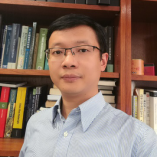Mechanics-guided design and optimization of Si-based?electrodes for lithium-ion batteries
发布时间:2020-11-11 作者:姚海民 来源:腾讯会议 浏览次数:
Among all potential anode materials for lithium-ion battery (LIB), silicon (Si) stands out for its high capacity and is deemed as the most promising anode materials for the next generation LIBs. But a major obstacle of using Si-based materials as LIB electrode material is the huge (300-400%) volume change of Si during the charge/discharge processes. As a consequence, fracture and delamination phenomena tend to happen in the Si-based electrodes for LIB, resulting in loss of electric conductivity, capacity fading, and degradation of the electrochemical performance. To alleviate this problem, we studied, by applying computational mechanics in combination with experimental verification, the lithiation-induced failure problems in a variety of anode materials including carbon-coated silicon core-shell nanoparticles (Nanoscale 8(2016),5254) and yolk-shell carbon-coated silicon nanoparticle (Composites Communications 1(2016), 1) as well as the interface between the electrode material and the current collectors (Materials and Design 177 (2019) 107851; 195 (2020) 108993). Our results not only revealed the mechanisms behind these failure phenomena but also proposed verifiable solutions to alleviating or even solving the associated problems.
姚海民博士现任香港理工大学机械工程系副教授。2000年获得清华大学工学学士学位,2002年获得清华大学工学硕士学位,2006年获得德国斯图加特大学材料科学博士学位,随后在美国布朗大学和麻省理工学院从事博士后研究工作。2010年3月学成回国,受聘于广州中山大学。2011年5月加入香港理工大学机械工程系任助理教授。2016年7月升任副教授并兼任机械工程学专业课程主任。姚海民博士的研究兴趣包括生物材料和先进能源材料的力学行为、仿生力学和仿生材料、接触力学和断裂力学。至今在Nature Communications, PNAS, JMPS, Carbon, Nanoscale等国际著名期刊上发表论文80余篇,被引次数超过3100 (Google), H-指数27(Google)。姚海民博士还担任了Materials Genome Engineering的副主编,Acta Mechanica Sinica的青年编辑及多家期刊的编委,包括Scientific Reports, Composites Communication, and Applied Mathematics and Mechanics。
